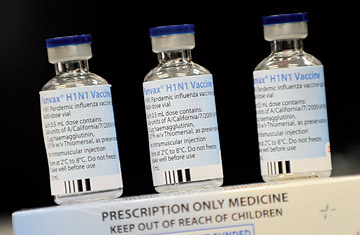
Workers in many hospitals have to get the 2009 H1N1 vaccine.
At Winthrop hospital on New York's Long Island, the signs are everywhere. They're posted at every nurses' station, papered above the security panels against which employees swipe their ID cards and even attached to paychecks. The notices are there to remind the hospital's staff — which includes everyone from the doctors and nurses who care for patients to the administrative, housekeeping and food-service personnel — that every employee must be vaccinated against both seasonal and H1N1 flu or face possible termination.
The mandate comes from the health department of New York, which over the summer became the first state to require that all health-care workers be vaccinated against influenza. In other states, individual hospitals have taken the same aggressive position. Given that the pandemic H1N1 strain is circulating the globe — and that one of the seasonal-flu strains is resistant to Tamiflu, a commonly used antiviral treatment — such a policy seems logical. But is it legal? Flu-vaccine requirements are being challenged by health-care workers who maintain that decisions about vaccination should be theirs and theirs alone. In the state of Washington, the State Nurses Association, which in general supports vaccinations, is suing a local health system over its decision to make the flu shot a condition of employment, while dozens of New Yorkers went to the state capital in September to protest the new immunization ultimatum.
Health-care workers are especially vulnerable to both getting sick with influenza and spreading it to patients. That's why the U.S. government has singled out these workers, along with other high-risk groups, to receive the first batches of 2009 H1N1 vaccine, which are just starting to arrive in some states. Vaccination can reduce the risk of getting influenza 70% to 80% and is the most effective way to curb the pandemic. "It is within the purview of health authorities that we engage in certain infection-control activities," says Susan Waltman, general counsel of the Greater New York Hospital Association, "and immunization of health-care workers is certainly among those activities."
Employers, notes Alabama labor-and-employment attorney Jennifer Swain of the firm Baker Donelson, can set conditions of employment. So does that mean any company could impose an H1N1-vaccine requirement as part of its business-continuity plan? Most likely yes, but Swain is betting that few non-health-care companies would be willing to endure the inevitable protests against such a policy. "In health care, it strengthens an employer's argument that an employee might cause a direct threat by not being vaccinated," she says.
Many states already require that people working in hospitals be immunized against measles, mumps and rubella, for example, and an influenza-vaccine mandate shouldn't be seen as any different from these standards. Yet when it comes to the flu shot, those in the medical field are notoriously incompliant: nationwide, only half of them voluntarily roll up their sleeves each year. "That just doesn't deliver the safe immunity level we need in a hospital," says Dr. Richard Daines, commissioner of health for New York State. It doesn't make sense, he says, for health-care workers not to be immunized against influenza. "That's just not tolerable in health-care institutions, where patients come to be safe."
But rigorous vaccination efforts, even voluntary ones, can brush up against thorny privacy issues. At Maryland's Johns Hopkins Hospital, personnel who choose to get a flu shot are provided with a colored clip to attach to their hospital ID. The idea is to make easily identifiable those who are unvaccinated and therefore need to wear masks when caring for patients with respiratory illnesses. The hospital intended to have two colored clips this year: one for seasonal flu and one for H1N1. But administrators realized that since the H1N1 vaccine is prioritized for specific groups, such as pregnant women and people with a weakened immune system, the clips would — at least initially — single out people with those conditions.
So for now, only those receiving the seasonal-flu vaccine will get a colored clip — this year it's yellow — and the system seems to be motivating employees to get their shots. "It introduces a bit of peer-pressure incentive to get vaccinated," says Dr. Aaron Milstone, a member of the hospital's infection-control committee. Still, in case the H1N1 situation worsens and not every health-care worker chooses to get immunized, Hopkins officials are considering additional measures, like making all those directly caring for patients wear a mask.
That is the type of alternative to mandatory vaccination that Angela, a nurse at Winthrop who prefers that her last name not be published, wants her hospital to offer. She has concerns about the mercury used in some flu shots and also feels that the New York State requirement is an infringement on her right to decide what treatments she receives. But neither of these reasons is sufficient to exempt her; only a medically documented condition like an egg allergy (flu vaccine is grown in chicken eggs) is an acceptable reason for not getting immunized.
If Angela does not get vaccinated by Nov. 30, she will be suspended. If she doesn't comply within 15 days after that, she could be fired. "We are still in open negotiations with the [hospital] administration," she says, hopeful that her employer can find some way to accommodate the objections she and others have to getting the shot. "I am not willing to be terminated, but I am willing to take it that far."
